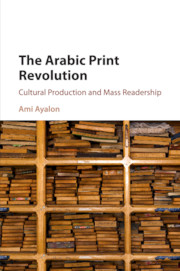Book contents
- Frontmatter
- Dedication
- Contents
- Preface and Acknowledgments
- Introduction
- 1 The Formative Phase of Arab Printing: A Historical Overview
- 2 Printers and Publishers
- 3 Books, Journals, Cartes de visite
- 4 Diffusion Channels
- 5 Advancing Circulation
- 6 Reading and Readers
- 7 Reading in Public
- Conclusion
- Bibliography
- Index
Preface and Acknowledgments
Published online by Cambridge University Press: 05 September 2016
- Frontmatter
- Dedication
- Contents
- Preface and Acknowledgments
- Introduction
- 1 The Formative Phase of Arab Printing: A Historical Overview
- 2 Printers and Publishers
- 3 Books, Journals, Cartes de visite
- 4 Diffusion Channels
- 5 Advancing Circulation
- 6 Reading and Readers
- 7 Reading in Public
- Conclusion
- Bibliography
- Index
Summary
As you know, I have received no money from the jabal [Mount Lebanon] nor have I received the [newspaper's] dues from Tunis. As for the other agents, some of them delay payment, while still others send in only a quarter or half of what they owe me. I have lost 700 francs to my agents in Algiers … He who gives, gives. I am not going to sue those who don't.
Thus wrote Aḥmad Fāris al-Shidyāq, owner of the weekly al-Jawā'ib, to a member of his family in 1866. Shidyāq, a celebrity of the Arab nahḍa, is remembered for his pioneering literary, scholarly, and journalistic work and his major contribution to his society's awakening. Seldom do we associate his role in Arab cultural history with financial hitches and agent malperformance. Even more rarely do we care to consider the debtors and agents themselves. Yet, hitches, malperformance, and other material and organizational factors were integral features of Shidyāq's literary routine, at once facilitating and encumbering it. They affected the work of all makers of the cultural change, eminent and lesser ones alike. Such constraints had a substantial impact on the scope and pace of producing written works, their dissemination in the region, and their availability to the emerging reading publics. Writers and thinkers who are known to us as trailblazers of modern Arabic thought and literary production were all subject to these checks. They also played an important role in advancing the necessary technical and logistic underpinnings, along with a body of auxiliary personnel of all stripes. Yet, in the rich and expanding literature on Arab cultural development of the time, these banal facets are seldom noticed and the many men involved in them remain largely unknown. Historians have usually focused on ideas, contents, and genres of the writings and on their broader historic implications. This book sets the spotlight on the other, less-known aspects of the story, without which there would have been no literary awakening.
Save for some modest precursors, it was only in the nineteenth century that Arabic texts began to be printed in the Middle East on a big scale, and only in its last third that printing became a considerable industry.
- Type
- Chapter
- Information
- The Arabic Print RevolutionCultural Production and Mass Readership, pp. ix - xivPublisher: Cambridge University PressPrint publication year: 2016

